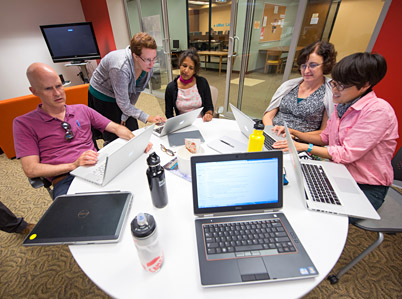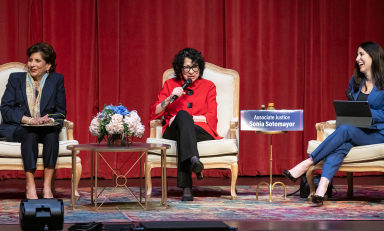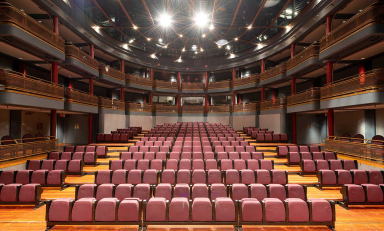
A three-year, $700,000 grant from the Andrew W. Mellon Foundation will make it possible for Occidental College to extend and deepen the integration of digital methods into student and faculty learning, teaching and scholarship.
Building on the work made possible by a 2010 Mellon Grant, the new grant will fund a faculty fellows program and support the establishment of a series of digital liberal arts lab courses. In addition, the grant will bring postdoctoral scholars, graduate research fellows and a regular stream of speakers, workshops and programming to the College. Finally, the grant also has provisions to support the development of regional partnerships with other like-minded institutions.
"Our first Mellon Grant helped build the necessary infrastructure for scholarship technology and supported faculty interested in integrating these new digital approaches into Oxy’s curriculum," said Daniel Chamberlain, director of the Center for Digital Learning + Research (CDLR).
"Now we can firmly establish a set of programs and practices that will keep Occidental at the forefront of thoughtful engagement with technological change, one that simultaneously fosters technical skills and a critical disposition toward digital scholarly discourse," said Chamberlain, who is the principal investigator for the grant.
The work of the CDLR and these programmatic innovations are critical to reimagine Occidental’s 90-year-old Mary Norton Clapp Library as an academic commons. "The recent renovation of Johnson Hall provides an example of what is possible when technology, design, architecture, teaching and research are brought together under one roof," Chamberlain said. "We are eager to play our part and work with new faculty fellows, dynamic Oxy students and the entire College community to develop a commons for the digital age."
"The ultimate goal is a simple one," says President Jonathan Veitch. "We want to create a new focal point for Oxy’s academic community, one that makes visible the College’s fundamental commitments as a 21st-century college of the liberal arts and sciences."
The grant:
- Extends faculty engagement in the digital liberal arts, moving from the broad introductory approach of the Mellon Digital Scholarship Institutes, held over the past three summers, to a more focused and in-depth fellows program for Oxy faculty.
- Enriches student engagement in the digital liberal arts through a developmental peer mentorship program, credit-bearing lab courses, and the Domain of One’s Own project, a customized Web space that students can take with them upon graduation.
- Integrates digital scholarship with the broader framework of academic support centers based in the academic commons, including the Center for Teaching Excellence, Undergraduate Research Center, Center for Community Based Learning, Advising Center and Center for Academic Excellence.
- Enhances regional partnerships with academic and cultural institutions that also are exploring and extending digital scholarship projects and methods as well.
- Develops a robust program of speakers, workshops, and other programming relating to digital scholarship.
"As we explore the role of digital scholarly methods at Occidental, we aim to do so in a manner consistent with a liberal arts education. Even as we experiment with new technologies, we will build in opportunities for critical reflection on the problems and possibilities that arise, including profound issues of privacy, surveillance, authority, democracy, ownership, pluralism and social justice," Chamberlain said.
Over the last decade, Occidental has received more than $3 million in grants from the Mellon Foundation for a series of innovative efforts in areas such as curricular planning, building community partnerships and digital scholarship.



